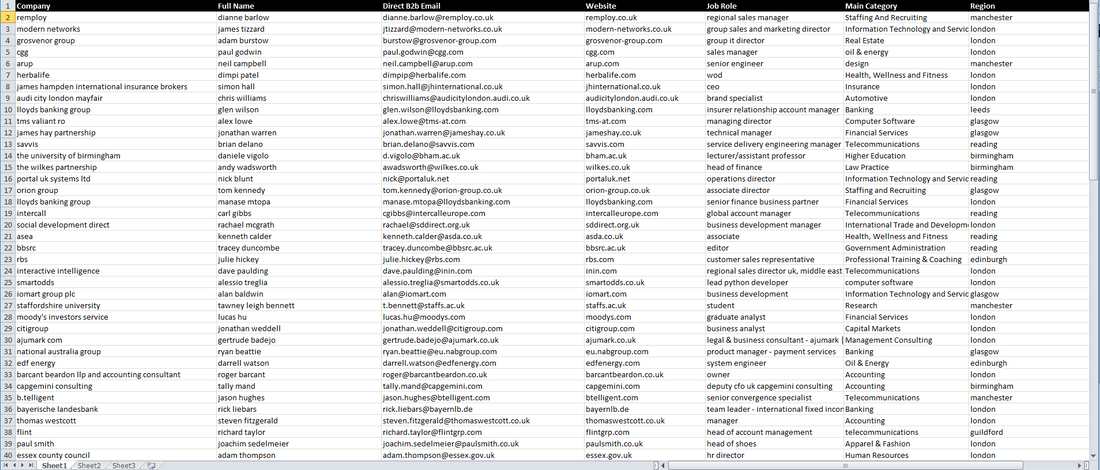20 Best Reasons For Picking Email List Sellers
20 Best Reasons For Picking Email List Sellers
Blog Article
What Are The Things I Should Consider Before Purchasing An Email List For Hematologists?
It's important to consider several aspects when buying a hematologist mailing list to ensure that the list you purchase is accurate, compliant with the law, and pertinent to the marketing objectives. These are the most crucial considerations to consider. Quality of data and accuracy
Source of Information: Confirm that the email list service uses reliable sources, such as professional directories, medical databases or verified opt-ins from doctors. The reliability of list will determine the quality of the list.
Verification & Updates: Ask your service provider about its data verification and updating process. Email addresses must be verified to remove any invalid or inactive email addresses. It is essential to update the list accurate when healthcare professionals switch jobs or institutions.
Segmentation by Specialization The list should be specific to Hematologists. If you are able, break the list further by subspecialty, location, years of practice, or an affiliation with a hospital. A well-organized list will help you focus your outreach more effectively.
2. Legal Regulations
Data Privacy Laws â Ensure that you are in compliance with data protection laws in place, including the General Data Protection Regulations (GDPR) for Europe and the California Consumer Privacy Acts (CCPA) for the U.S. and other applicable laws. This means the emails must be gathered with proper consent.
CAN-SPAM Act: In the U.S.A. make sure that your list is compliant with the CANSPAM Act that governs commercial emails communications. Infractions could result in fines and the flagging of your email as spam.
Opt-in Consent. The list of email recipients should be composed of hematologists, who have opted explicitly in to receive emails from third parties. Unsolicited email messages sent to patients without their consent could lead to low engagement as well as legal issues.
3. Provider Reputation
Find out the reputation of the company. To determine if the business is trustworthy, search for testimonials, reviews as well as case studies. A reliable company with a solid track record is much more likely than not to provide high-quality, reliable data.
Transparency. Choose a service that has openness about the source and method by which data was gathered. The providers who are ambiguous and unclear on how they collect data ought to be avoided.
Customer Support: A reliable provider will provide excellent customer support. It is possible that you require assistance with technical issues, list customisation, or concerns regarding compliance. A strong customer support can make a big difference.
4. Cost and Return on Investment (ROI).
Pricing Model: Pay close attention to the pricing structure. Is it a flat fee or a pay-per -contact? Check that the price is aligned with the potential ROI. The quality of the list should be balanced and volume with your budget.
Refund and Replacement Policy. Most reliable providers will offer the option of a refund or replacement policy if the email address is invalid or has expired. Be sure to read the policy's terms before purchasing.
Value in comparison to price: Examine the features of the list (such as segmentation and accuracy guarantee offered by the service provider) against the cost. It might not be worth the cost to buy the most affordable listing when the data quality is not good.
5. Data Ownership & Usage
Single Use in contrast to. Multiple Use: Be certain to read the conditions of making use of the email list. You may be able to utilize the email list only for one campaign with some service providers, while others allow unlimited usage.
Exclusive vs. Shared Lists - Find out if this email list is only yours to keep or shared with others. Exclusive lists are more likely to provide greater engagement because the contacts will be less likely to receive marketing emails from multiple sources.
6. Data Integration and Format
Email list compatibility: The list must be compatible with CRM or email tools. It is important that the list is available in standard formats, like CSV and Excel for ease of integration.
How easy is it to sort the list and manage it? Lists that are difficult to segment and work with can affect the effectiveness of marketing campaigns.
7. Ethical Questions
Relevance to Hematologists - Make sure your emails are relevant to hematologists. Sending content that is not appropriate to their expertise may negatively impact your brand's reputation and cause poor engagement.
Beware of Spam practices. Do not overwhelm recipients with a lot of messages. Sending emails too often can result in complaints about spam and harm your reputation as an email sender.
We also have a conclusion.
Buying a hematologist email list could be an effective instrument for targeted marketing but it needs careful evaluation. Take into consideration the accuracy of the data and reputation of the company, and their compliance with privacy legislation to ensure you get an accurate list. The importance of ensuring compliance with the law, ethical marketing and segmentation will allow you to maximize your ROI while maintaining your brand reputation. Take a look at the top rated hematologists email list for more info.
When You Are Buying An Oil Industry-Related Email Database, There Are 10 Essential Points To Be Aware Of.
It's crucial to take into account several factors prior to purchasing an email list within the oil and gasoline industry. This will guarantee that the list contains high-quality information legally compliant and is highly targeted. Here are the top 10 factors to take into consideration:
1. Relevance for the intended audience
Check to see if the email list is targeted at the oil and natural gas industry. Lists should be segmented so that they include professionals such as engineers, geologists and managers of operations in the upstream, middlestream and downstream.
Look for the job titles and roles which include the most appropriate decision makers within the company you're targeting (executives or engineers, managers). You may also look for specific companies.
2. List source and vendor Reputation
Reputable Suppliers: Purchase only from reliable and trusted providers of email lists who adhere to the best methods of data collection. Avoid sources that are of questionable origin, as these can lead to poor quality information or even legal problems.
Quality of Data: Read or testimonials from the provider to evaluate the reliability and quality of the data.
3. Data Accuracy and the quality of data.
Data Age : The list must be updated with the latest contact details. Oil and gas companies frequently undergo staff change. Older contacts may cause an increase in bounce rate.
Verification Process â Ensure that your vendor is consistently checking and updating their contact list to eliminate any inaccurate or unresponsive names.
4. The compliance with Regulations (GDPR, CAN-SPAM, etc.)
Legal Compliance: Ensure that the list adheres to international and local regulations including the GDPR and CAN-SPAM, which regulate the collection and use of personal information. Failure to comply could lead to legal risks and penalties.
Opt in Process: Verify whether the email address on the list was obtained with the consent of the recipients, i.e. they've chosen to receive emails.
5. Segmentation Customization, Segmentation and Configuration
Custom Segmentation. The best list providers offer options to segment according to specific criteria such as location, role in the business, size of the company, or subsector within oil & gas.
Custom Filters. Based on your campaign's goals be sure the list is customizable in accordance with criteria like location, business size, or special needs.
6. Deliverability Rate
High Deliverability Rates A well-designed list of email addresses will have high rates of deliverability (normally 95%). Low-quality lists often contain high bounce rates, which can harm your sender reputation and email marketing efforts.
Testing and Metrics: Ask the vendor for metrics of deliverability or performance data from the past to judge the list's success.
7. Volume Vs. Qualitative
Quality over Quantity - Be sure the list you create isn't just large but also highly precise and targeted. A smaller, but highly-quality mailing list can be more effective than one that's big and general.
Engagement Metrics Prioritize Engagement Rates Over Contact Numbers. An active audience is more likely to be more responsive to your marketing.
8. Pricing and Cost Structure
Transparent Pricing - Understand the pricing structure, regardless of whether it's a one-time or ongoing subscription. Beware of lists that offer very low prices as they might not provide quality or worth for money.
Return on Investment: Compare the cost of the list against the conversion rate that is expected to determine the ROI. It is sometimes more cost effective to pay more for a list with a high conversion rate.
9. Privacy of Data and Security
Data Protection: Check to ensure that the vendor is using strong security practices. The list provider must ensure that all personal information is protected from unauthorized access.
Confidentiality. Confirm with the provider that they will not sell or share your data. This is crucial particularly if confidentiality and confidentiality are crucial for your business.
10. Customer Service and After-sales Support
You should be able to contact the vendor for support on a regular basis in case you require assistance in completing your list, or if there are any problems.
List Replacement Guarantee in the event that there are problems with a list (e.g. inaccurate data or poor delivery) A reputable provider will provide a refund or replacement.
These aspects will allow you to choose an email list for the gasoline and oil industry that is efficient and legal. It must also be in line with your business goals. View the top rated for site tips.